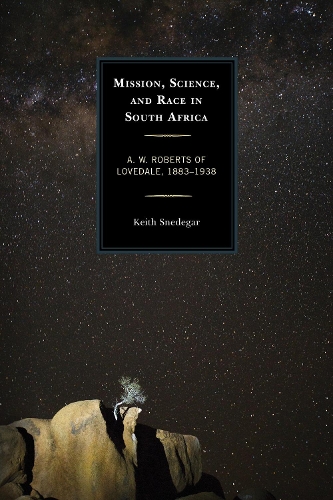
Mission, Science, and Race in South Africa: A. W. Roberts of Lovedale, 18831938
(Hardback)
Publishing Details
Mission, Science, and Race in South Africa: A. W. Roberts of Lovedale, 18831938
By (Author) Keith Snedegar
Bloomsbury Publishing PLC
Lexington Books
17th September 2015
United States
Classifications
Professional and Scholarly
Non Fiction
Christianity
Religious mission and Religious Conversion
Social discrimination and social justice
Ethnic studies / Ethnicity
Racism and racial discrimination / Anti-racism
266.00968
Physical Properties
Hardback
206
Width 160mm, Height 234mm, Spine 20mm
440g
Description
This is a biographical study of Alexander William Roberts, a Free Church of Scotland missionary educator who in 1883 was posted to the Lovedale Institution at Alice, South Africa. Inspired by the night sky of the southern hemisphere, Roberts became a leading observer of variable stars and an early contributor to the theory of close interacting binary stars. He actively promoted the development of colonial scientific culture and was elected president of the South African Association for the Advancement of Science in 1913. His teaching career at Lovedale fostered a commitment to the interests of his African students and their communities. In 1920 Roberts was appointed to the South African senate to represent native Africans; he also served as senior member of the Native Affairs Commission. Despite his liberal instincts he acquiesced to the movement toward racial segregation as advanced in the Natives (Urban Areas) and Native Administration Acts. Roberts nonetheless militated against the erosion of the Cape non-racial franchise rights; he resigned from the Native Affairs Commission just as the all-white parliament was poised to remove Africans from the common voters roll. His engagement with the politics of race interfered with Robertss astronomical research. Although he published nearly one hundred papers in scientific journals most of his observational data remained unknown until the Boyden Observatorys Roberts archive was digitized in 2006. His influence as a mission educator also has been little known, although among his pupils were journalist and academic D.D.T. Jabavu, the physician James Moroka, and Swazi king Sobhuza I.
Reviews
[T]his painstakingly researched biography makes a valuable contribution to our understanding of an important historical period. Historians of astronomy will especially appreciate Snedegars summation of Robertss research methods and his correspondence with other (perhaps less starry-eyed) stargazers. * Isis *
In this biographical study, historian of science Keith Snedegar reassesses a neglected historical figure, the astronomer, missionary educator, and politician Alexander W. Roberts. . . .[T]he text draws on a wide range of published and archival sources housed in the United Kingdom, United States, South Africa, Australia, and the Netherlands. . . .Mission, Science and Race in South Africa is a history of paths not taken in the history of South Africa and the Anglophone Atlantic. It is a unique intellectual history of the emergence of modern South Africa, from the perspective of a man who was ill-suited to participate in its cultural and ideological shifts. * African Studies Quarterly *
Most books on the history of mission education in South Africa mention Alexander William Roberts only in passing or in a footnote. Keith Snedegar, Professor of World History at Utah Valley University, has taken the trouble to study the rich material contained in Robertss papers besides that in an impressive number of other collections, and to reconstruct his lifes story. . . . Snedegar does not hide his critical attitude and provides a portrait that shows Robertss weaknesses and limitations. His study is a welcome addition to the complex history of South Africa liberalism, but at least as much a contribution to the history of education and the historiography of knowledge and science. * Journal of Ecclesiastical History *
Snedegars study is a tour de force of research into the political and scientific background of the South Africa in which Roberts lived and made his mark. For my own part I found it hard to put down, opening as it did for me many aspects of the scientific and political life that prevailed a century ago. -- Ian S. Glass, South African Astronomical Observatory
In this judicious, enlightening, and well-researched book the work of Alexander W. Roberts, amateur Scottish missionary, educationist, astronomer, and 'native expert', is recovered and brought to life; through Roberts, we are launched into the closely intersecting worlds of politics, science, and culture in the formative period of the first 'new' South Africa. -- Saul Dubow, Queen Mary University of London
A compelling biography of a complex man in a complex time. With verve and authority, Snedegar recounts A.W. Roberts life as a missionary teacher and liberal activist in South Africas racial policies, while also expounding, most accessibly, Roberts work as a talented but non-professional astronomer. Both as an activist and a scientist Roberts met with grave disappointments. But his long struggles, in Snedegars able hands, abound with insights into the political and intellectual life of a strife-ridden colony in the declining years of the British Empire. -- Richard Elphick, author of The Equality of Believers: Protestant Missionaries and the Racial Politics of South Africa
Author Bio
Keith Snedegar is professor of world history at Utah Valley University.
